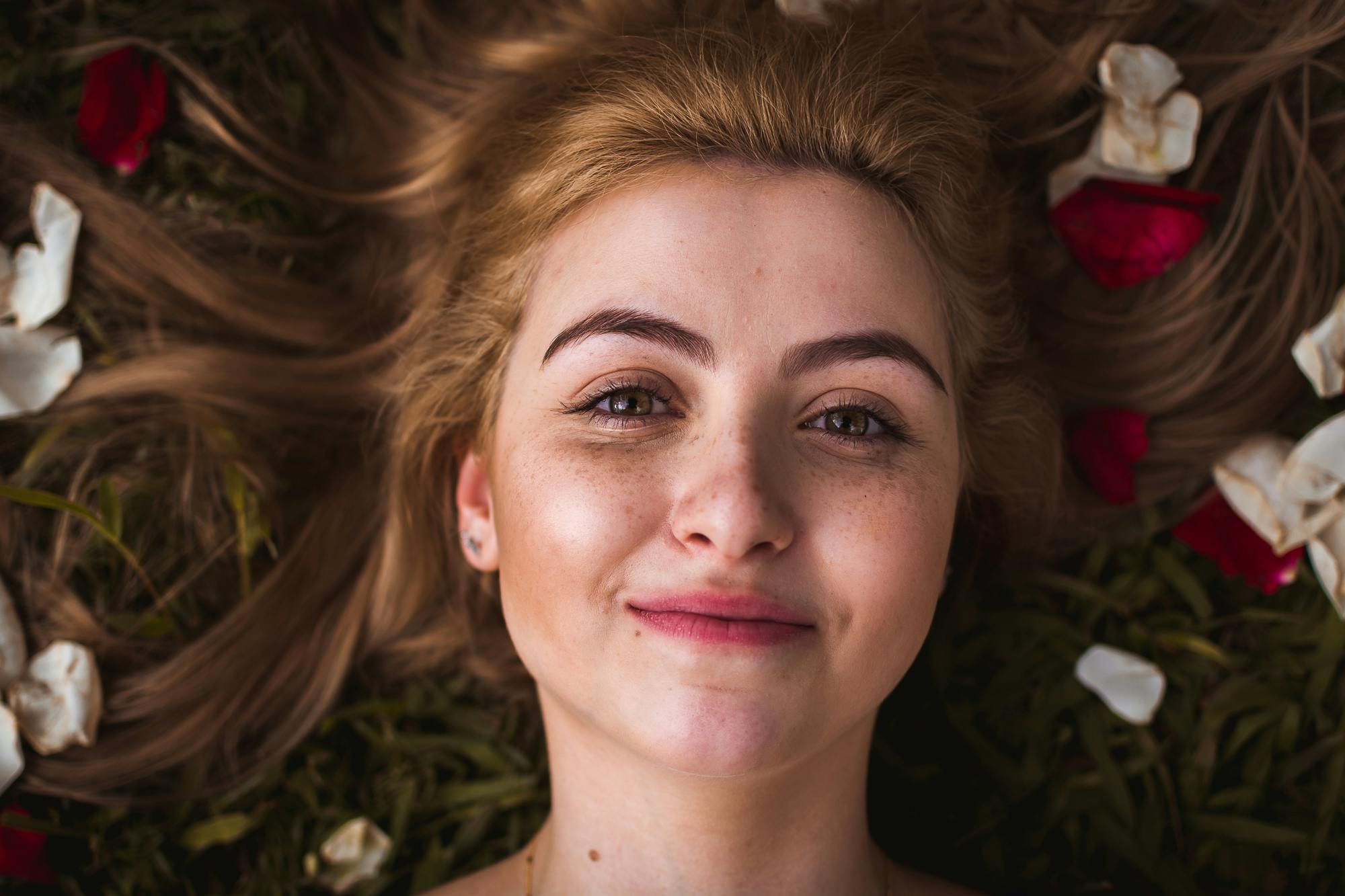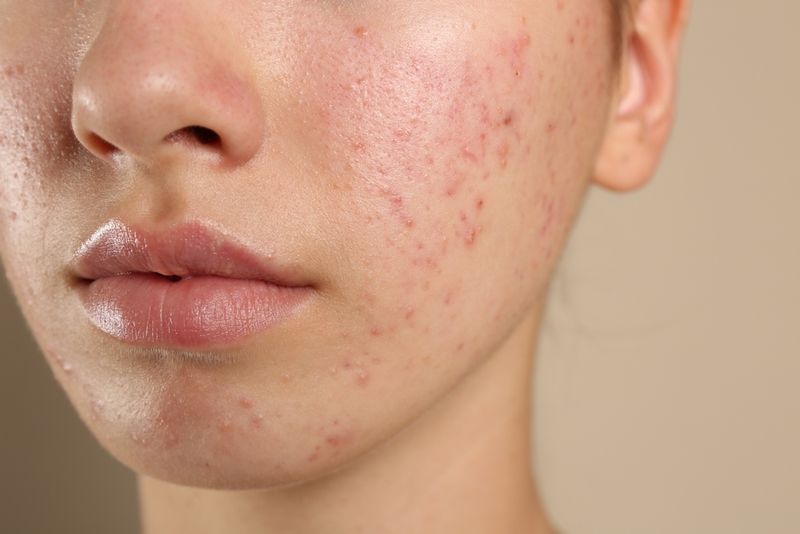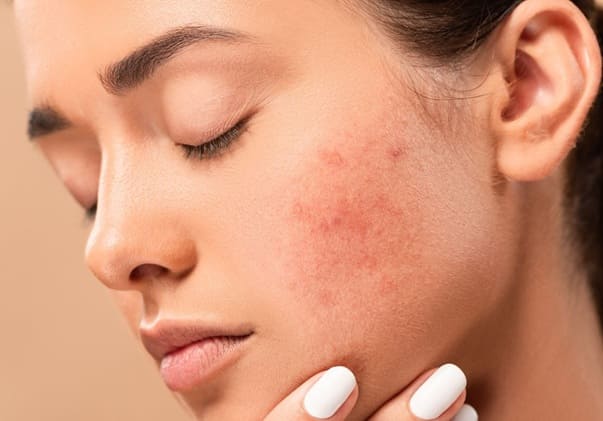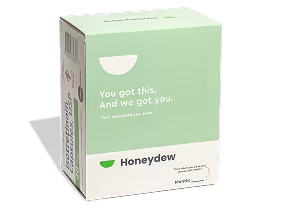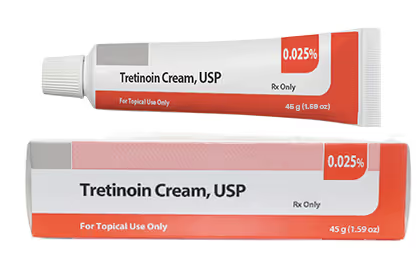Body acne is a widespread issue that can be difficult to eliminate. It affects people differently and usually requires a tailored approach to treating it successfully. To help you on your acne-eliminating journey, this article will explain the causes of body acne and provide tips on how to treat it effectively.
Different Types of Body Acne
Body acne can be divided into two main categories: non-inflammatory and inflammatory acne.
Non-Inflammatory Acne
A combination of hormones, genetics, and lifestyle choices usually causes non-inflammatory acne. To treat it, start by regularly exfoliating the skin to remove dead skin cells that can clog pores. Dr. Joel Spitz, Honeydew’s Chief Medical Officer, recommends gentle chemical exfoliants over mechanical exfoliants (e.g. gentle scrubs, loofahs or washcloths), as any mechanical exfoliation can aggravate acne. If you have excessively oily skin, try using an oil-free face wash or acne cleanser to keep your skin clean. You can also apply acne spot treatments to reduce inflammation and encourage healing.
Non-inflammatory acne can often need professional treatment to help.
Inflammatory Acne
Inflammatory acne is more severe and usually requires professional treatment. Start by consulting with a dermatologist who can evaluate your skin and recommend the best treatment. This may include prescription medications, antibiotics, steroid injections, or laser treatments. Maintaining a proper skincare routine that includes a gentle acne cleanser and moisturizer is also essential to keeping acne-causing bacteria at bay.

What Causes Body Acne?
Acne forms from an overproduction of oil in your sebaceous glands, which leads to clogged pores and an accumulation of dead skin cells and bacteria. Hormones, genetics, and lifestyle factors can all cause this oil production.
Genetics
Genetics plays a significant role in acne breakouts, especially body acne. Many people inherit cystic acne or scarring acne only on their back or chest, while their face remains remarkably clear. In cases like these, genetics is often to blame. Additionally, what may work to combat facial acne may need to be more practical or even fit for use with body acne due to its deeper roots and more stubborn nature. It’s essential to tailor your treatment based on where the acne appears and how severe it is; that way, you can maximize the effectiveness of your treatments so you can get clearer skin faster.
With Honeydew, we use an evidence-based approach to track your skin’s progress and refine your plan, so you achieve better results faster.
Stress
Stress is another major acne trigger that can contribute to body acne breakouts. When you’re stressed, your body releases certain hormones, which can cause an increase in oil production and lead to clogged pores. This leads to acne breakouts on the face and body. To combat acne caused by stress, try incorporating relaxation techniques into your daily routines, such as yoga, meditation, or deep breathing exercises. These activities will help reduce the amount of cortisol (the “stress hormone”) in your body and reduce inflammation associated with acne breakouts.
Hormones
Hormones play a significant role in acne breakouts, especially body acne. During puberty, hormones like androgens increase in your body, which can lead to an overproduction of oil. This excess oil clogs pores and leads to acne outbreaks on the face and body. Hormonal acne is typically more severe than other types of acne due to its deeper roots and more stubborn nature. To combat hormonal acne, you may consult with a dermatologist for prescription medications or even consider taking oral contraceptives if hormone imbalances cause your acne.
Anabolic steroids
Anabolic steroids can also cause acne breakouts, especially on the chest and back. Anabolic steroids are synthetic hormones that stimulate testosterone production in the body, which can result in excess oil production. This overproduction of oil clogs pores and leads to acne breakouts known as truncal acne – severely inflamed nodulocystic acne on the chest and back.
Honeydew can help you treat body acne with licensed experts, prescription medication, and ongoing support. At home, on your schedule.

5 Ways to Get Rid of Body Acne
If you’re looking for ways to get rid of body acne, a few treatments can help. You should see results with the right combination of treatments, patience, and time.
Want to learn more about body acne treatment? Dive into the following insights with Dr. Joel Spitz.
Acne Cleansers
Using acne cleansers can be an effective way to fight acne breakouts on the body. Benzoyl peroxide acne cleansers reduce acne-causing bacteria, unclog pores, and help clear up acne blemishes. To use a benzoyl peroxide acne cleanser:
- Apply generously onto your chest or back and leave for 5 minutes before rinsing off in the shower.
- After washing off, take extra care, as they can cause skin irritation if not fully rinsed properly.
- Test your concentration tolerance. Products with 2.5% or less benzoyl peroxide will be gentler on the skin, while products with 10% benzoyl peroxide will have more effective results faster. However, irritating your skin will not help clear acne, so avoid using a higher concentration if it’s irritating.
Exfoliate
Exfoliation is also essential for acne-prone skin, especially on the back and chest. Exfoliating helps to remove dirt and oil that can clog pores and lead to acne breakouts. When exfoliating your body acne, try using a gentle chemical exfoliant. Avoid harsh scrubs containing plastic beads, as these can irritate acne-prone skin.
Topical Prescriptions
If acne breakouts on your body are severe and don’t respond to over-the-counter treatments, your doctor may suggest a topical prescription. Topical antibiotics reduce acne-causing bacteria, while topical retinoids help unclog pores and reduce acne inflammation. Depending on the severity of your acne, your doctor may also suggest oral medications such as isotretinoin or antibiotics.
Topical Retinoids
Topical retinoids are an acne treatment that helps reduce acne breakouts by unclogging pores and reducing inflammation. Retinoids come in prescription and over-the-counter varieties, so be sure to talk to your doctor or dermatologist if you’re considering using this product. When using topical retinoids, start with a low-concentration product—generally, 0.01% or less—as higher concentrations can irritate the skin. Additionally, apply the product at night to avoid potential photosensitivity reactions caused by UV exposure during the day. With regular use, acne breakouts should improve as dead skin cells are removed from the skin’s surface.
Oral Prescription
In moderate-to-severe acne cases, your doctor may suggest oral medication. Oral antibiotics reduce acne-causing bacteria and can help minimize acne breakouts in the body. Isotretinoin, also known as Accutane, is an oral retinoid that clears acne without applying topical treatments. This powerful drug can be very effective in treating facial and truncal cystic acne, which is often resistant to topical and oral antibiotics. As with any acne treatment, talk to your doctor or dermatologist before starting new medications.
Get the Dermatology Care That Works For You
Honeydew provides personalized acne care tailored to your individual needs. Our acne treatment plans may include topical creams, oral medications, and even lifestyle recommendations, including diet and a proper skincare routine. With Honeydew’s team of experienced providers, you can take control of your acne and achieve your skin goals. Contact us today to start the journey to healthier skin.





